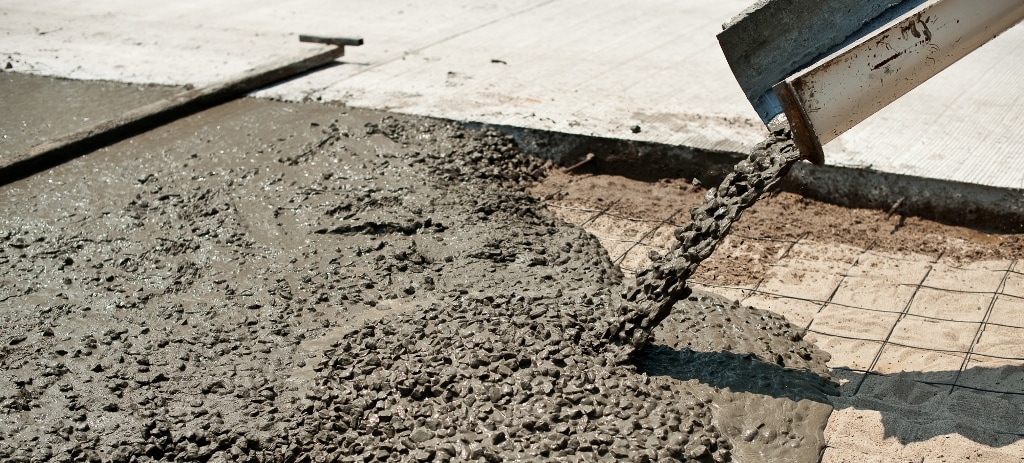|
By Cathy Habas
Concrete is a ubiquitous building material that has been in use for thousands of years. The mega structures of our modern world, including skyscrapers, dams and underground tunnels, would not be feasible on such a large scale without a cheap, easy to use, low-maintenance and durable building material.
Humble concrete is the only substance that comes close to satisfying these parameters. What makes this deceptively simple material so useful? Let’s take a look:
How Does Concrete Work? Concrete is composed of limestone (CaCO3) and clay (specifically, silicon from the clay: SiO2). When heated to a temperature of 1450 degrees Celsius, calcium silicates (C3S and C2S) are formed. These compounds react with water in a process called hydration to form crystals that bind together and glue the other two components of concrete (sand and larger rocks called aggregates) together into a solid, dense structure. Concrete Has Been Around for Thousands of Years But Continues to Be Developed The use of concrete can be traced back to around 10,000 years. Thanks to modern technology, it continues to be developed and improved, and new uses for concrete are found all the time. For example, concrete serves as an effective shield against nuclear radiation, and biologists at Delft University of Technology have even discovered a way to use bacteria to automatically repair cracks in concrete structures. In short, concrete can be considered one of the most important inventions for modern humans, allowing industrialization and urbanization to progress. Its unique properties, combined with the clever curiosity of the scientists who study it, have made it suitable for an astounding number of projects. It’s easy to take concrete for granted because it is absolutely everywhere. and yet society as we know it surely wouldn’t exist without it. 
About the Author
Cathy Habas is a Louisville-based freelance writer specializing in fashion, health and home improvement. She received her Bachelor of Art's degree from Indiana University Southeast in 2014 and has been writing professionally ever since. In her spare time, Cathy loves to spend time outdoors with her posse of dogs when the weather's nice. Comments? Leave them below!
22 Comments
11/23/2018 01:48:23 am
It’s great to learn about the benefits of concrete.Reading to your blog I got to learn more about the concrete.Keep sharing your Knowledge with us. You have wriiten amazing article and it is very beneficial for the students.
Reply
8/23/2019 03:04:00 pm
I like that you said that when combined with steel and special aggregates, the overall strength and utility of concrete is second to none. My husband and I are going to have a house built and we are trying to decide on the right type of foundation for our home so that we can start off the right way. I think that a concrete foundation would be smart because it could last a long time and be strong enough that we wouldn't have to worry about needing to redo it anytime soon which would be nice.
Reply
10/31/2019 04:29:53 pm
That's great to learn concrete doesn't compress under heavy loads. There've been some problems with the outside of my house. I'm going to have to look into concrete services.
Reply
12/6/2019 04:26:34 pm
Thank you for helping me to understand that concrete makes a good construction material because it stays stable and rigid under heavy weight loads. I would imagine that this would be very useful for constructing large buildings that include multiple levels. It would be interesting to learn more about how commercial contractors utilize concrete in construction.
Reply
12/17/2019 01:12:56 pm
That's awesome that concrete can support heavy weight, which makes it great for buildings or containing water. My brother is looking at building some benches for a park the city is making. We'll have to look into concrete street furniture.
Reply
1/16/2020 11:52:58 am
It was interesting when you talked about how concrete achieves its dense structure by binding together its components through hydration. Now that I think about it, it makes sense that concrete is used so widely for foundations and base slabs in both residential and commercial applications. Thanks for sharing this interesting info about the history and uses of concrete!
Reply
Charles Sulivan
1/23/2020 05:26:24 am
The in-compressible nature of <a href="https://www.concretecontractors.org/" >concrete material</a> despite load at hand makes it more unique.
Reply
4/24/2020 05:42:24 am
Good article with an excellent way of presentation. Keep it up. Thanks for sharing.
Reply
7/29/2020 08:41:32 pm
Cheap, versatile, reliable and perhaps most importantly - unlimited! We can feel good using concrete in our projects knowing that we're not taking from the supply of a vanishing resource. It's an efficient way to meet the demands of urbanization and a reliable way to add some appeal to your property in many shapes in sizes. We're contractors, so we're biased, but it's awesome to see somebody else that's of a similar mind! Thanks a lot for sharing.
Reply
2/10/2021 03:55:34 pm
I can see how a business could really benefit from getting the right materials to build their building. Making sure that they can get their supplies from a professional could allow them to be a lot safer. It was interesting to learn about how concrete is in a fluid slurry form, and it can be transported safely in order to be easier to install.
Reply
5/26/2021 11:43:35 am
I love that you mentioned that concrete can bear heavy loads without a problem. My city is building a new concrete office building. it looks so cool and industrial!
Reply
I like that you pointed out that concrete remains stable which can ensure that it can withstand heavy weight. With that in mind, I will make sure that the foundation of our property will be made from concrete. It would be perfect for our future home which we plan to have four floors.
Reply
8/26/2021 02:08:01 pm
I can see how a business could really benefit from getting the right kind of concrete. Getting some help from a professional could allow them to be more effective. It was interesting to learn about how concrete can continue to be developed even though it has been around for thousands of years.
Reply
9/28/2021 11:29:33 am
I liked it when you shared that it is important not to take concrete for granted since it is useful for an astounding number of projects. It can bind together into a solid, dense structure that is suitable for a lot of structures. I would like to think if a company is looking for concrete mixes, it should consider getting high-quality ones from a reliable supplier.
Reply
10/3/2021 04:23:14 am
Moisture and humidity can damage other construction materials except concrete due to rust or rot. Other elements such as moulds and termites will not have an adverse effect on concrete.
Reply
10/12/2021 12:38:34 pm
It's great that you talked about concrete and what makes it such excellent building material. Recently, my uncle said he's interested in investing in a construction project. My uncle wants to know more about building materials, so he'll choose the right one, and your article will definitely provide key insight to him. Thanks for the information on concrete and how it's super easy to use.
Reply
11/22/2021 07:48:36 am
Concrete lasts decades longer than alternative building materials, and actually gets stronger over time. This reduces the total cost of ownership as well as the environmental impact associated with more frequent rehabilitation or reconstruction.
Reply
12/23/2021 02:07:30 pm
Concrete that is constantly submerged in ocean water, for example, benefits from some added protections. Thank you
Reply
1/9/2022 11:56:03 am
To easily integrate steel reinforcements within the concrete, and to even customize its color and texture. I truly appreciate your great post!
Reply
Your comment will be posted after it is approved.
Leave a Reply. |
LIFESTYLE BLOGRead our lifestyle advice, written exclusively for pre-professional women in science and engineering. From advice about fashion, work and family balance, self, wellness, and money, we've got you covered! |
The Scientista Foundation, Inc. All Rights Reserved © 2011-2021 | Based in NY | [email protected]
The Network for Pre-Professional Women in Science and Engineering
The Scientista Foundation is a registered 501(c)(3) -- Donate!
The Network for Pre-Professional Women in Science and Engineering
The Scientista Foundation is a registered 501(c)(3) -- Donate!

